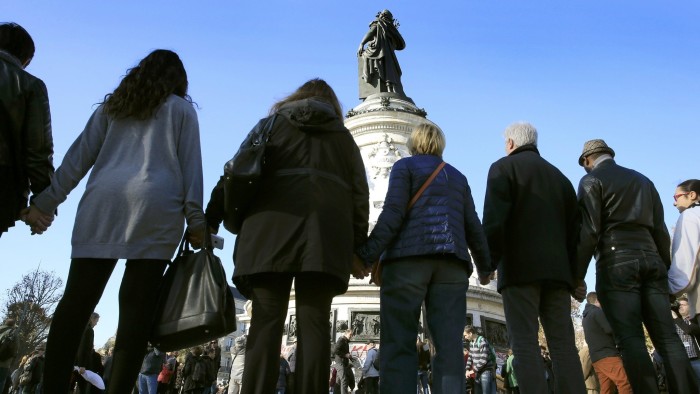Paris attacks: Belgium forced to confront homegrown jihadis

Roula Khalaf, Editor of the FT, selects her favourite stories in this weekly newsletter.
Belgian officials promised a crackdown on extremism after two of the attackers killed during the Paris terrorist plot were identified as Brussels residents. It is the fifth time in 18 months that the country has been linked with a big terrorist attack.
Armed police in Brussels arrested seven people over the weekend in relation to the attack in a series of raids in Molenbeek, a rundown area of the city with a large Muslim population.
A car with Belgian number plates found at the scene in Paris had used parking tickets from Molenbeek, helping lead police to the neighbourhood, where earlier this year authorities foiled an elaborate plot by extremists to attack local police.
Belgium’s increasingly prominent role in the attack has revived long-running concerns about the country’s ability to handle its own security as it struggles to cope with a fractured police force, a poor record on integration and the largest per-capita population of Syrian foreign fighters in the EU.
Belgian interior minister Jan Jambon singled out Brussels — and particularly Molenbeek — as a weak spot in Belgium’s security. “We can’t accept this any longer — we have to look at how to tackle this problem, how to eradicate it once and for all,” said Mr Jambon on Belgian television on Saturday night.
The Belgian public prosecutor said two of the vehicles used by the Paris attackers were rental cars that had been hired in Brussels. One was found near the Bataclan concert hall, where most of the victims were killed, and the other near a Paris cemetery a mile to the east.
One of the men who rented the car may still be at large. His identity was hoovered up during a check of cars on the A2 motorway that links Brussels and Paris early on Saturday morning. Law enforcement connected him to the rental contract later in the day and the car was picked up in Molenbeek that afternoon, authorities said. But they did not say whether he was one of the men arrested during the Saturday sweep.
Security in Belgium has become a worry for counterterror officials across the EU, who have long been nervous about the number of Belgian nationals who have gone to fight in Iraq and Syria, as well as the ease with which firearms can be bought in the country. One security official from a neighbouring country dubbed it “the failed state on our border”.
Podcast

On a per capita basis, Belgium has more foreign fighters than any other EU country. About 500 people from the country of 11m are thought to have left to fight in the Middle East with 101 of these hailing from Brussels, according to Pieter van Ostaeyen, an independent researcher on foreign fighters.
The bulk of those based in Brussels come from Molenbeek. Although just 30 minutes on the metro from the diplomats and bureaucrats in the EU quarter, Molenbeek struggles with an unemployment rate of about 30 per cent — treble the national average.
Belgium has the EU’s highest gap in employment rates between the foreign-born and native population, according to the OECD. “They made terrible mistakes in integration — and now they have something that is difficult to control,” said one security consultant who requested anonymity.
Belgium’s small size and fragmented police force make an ideal spot for arms-smuggling, according to security experts. “The top point is that Belgium is never more than 30 or 40 minutes from a border,” said one. This problem came to the fore in January: one Belgian citizen is being investigated for supplying the firearms used in the attack on the French satirical newspaper Charlie Hebdo earlier this year.
Although Brussels has a population of just 1m people, its police force is fragmented into six operationally independent units, often leading to communication breakdown. “There is a problem with exchange of information,” Mr Jambon said.
After a French national who had fought in Syria opened fire at Brussels’ Jewish museum last year, killing four, one Brussels police officer faced sanction for being too slow to pass on information from an informant relating to the attack. In the intervening period, the suspect escaped.
Anti-terror raids by Belgian police have become a familiar sight in Molenbeek, which has been linked with a string of attacks. Mehdi Nemmouche, the Jewish museum shooter, lived in Molenbeek and a string of raids in the neighbourhood covered the plot to kill Belgian policemen just days after the Charlie Hebdo attacks. Two suspects were killed by police in the east of the country on the same night.
More recently, a man armed with an AK-47 boarded a high-speed train to Paris at Brussels’ Gare du Midi in August; he was subdued by off-duty US military personnel on the train. Although from Morocco, he had been staying in Molenbeek before the attack.
Security experts suggest that the attacks are almost certainly linked. The similar weapons and methods — including the refusal to speak to police once arrested — used in each attack point to a single cell operating in Molenbeek, according to officials who declined to be named.
“We don’t have control of the situation in Molenbeek at present,” Mr Jambon said. “We have to step our efforts there to ‘clean up’ what’s going wrong.”



Comments